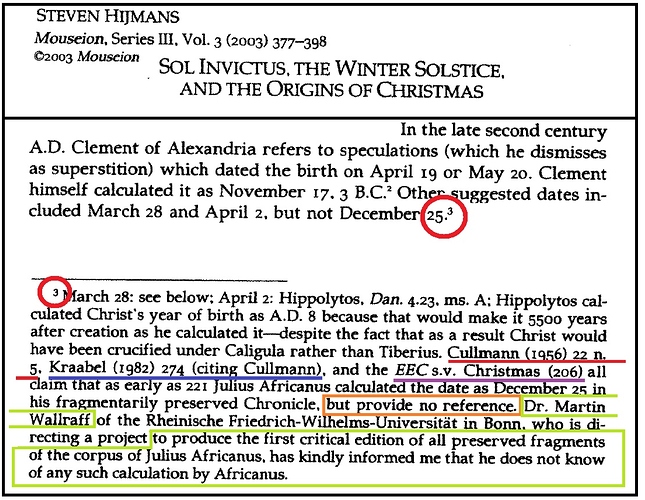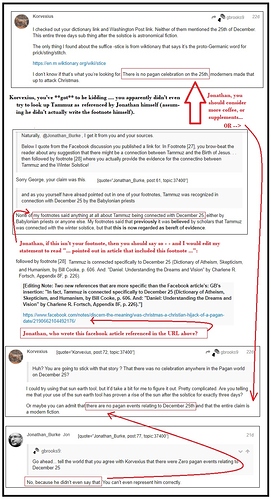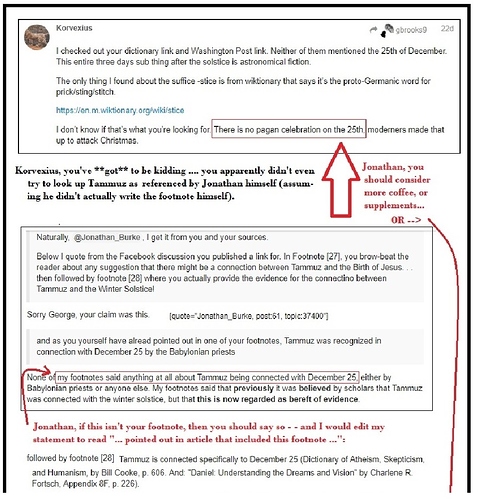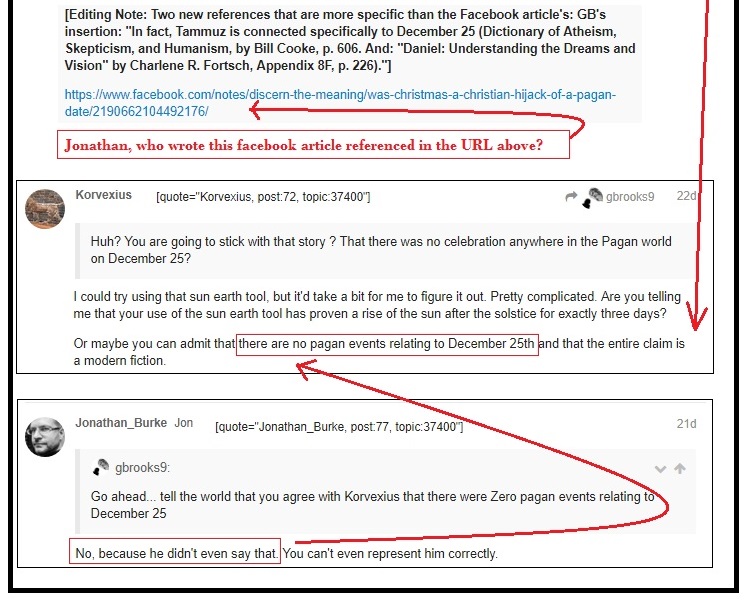Obviooously that’s improbable. Only a loon would claim Agapius was a textual critic.
Was he working directly from Josephus, then? My impression was it was probably copied multiple times in addition to the translations.
Not to mention that Agapius was a Christian Arab, so if anything it is very unlikely he would have had any motivation to downpeddle any Christian interpolations.
Does this guy’s ‘Was Zeitgeist right?’ series have any truth behind it?’ from what I’ve seen, ehat he does back it up with evidence. I didn’t watch all of his videos for fear I might lose my sanity however:
Michael Sherlock is what you get when you take Richard Carrier’s bad history, DM Murdock’s love for the false causation fallacy, Richard Dawkins’ way of presenting (bad) arguments and Christopher Hitchens’ great rhetoric but use it for speaking nonsense, combined with an aggressive behaviour. He thinks Murdock was a great scholar, so that should give you a clue of what you should expect from him.
I found one of his articles on a popular Hispanic atheist website and looked for it in English. If you are interested, here you have:
Then, I realised that he is one of those guys who uses the word “reason” for everything.
I think Tim O’Neill should respond to him one of these days.
See? That’s why I think Murdock’s website should be taken down: to avoid people saying such nonsense. Even Richard Carrier responded to her twice on that subject.
Oh, BTW, Carrier replied to me when I asked him about the “Spanish Joseph Atwill”.
“There are references to Sol Invictus and December 25 before the official Roman adoption of Christianity.”
There are? Okay - cite them.
Great to see you here!
There is no textual evidence.
But if it is Tim O’Neill himself!
Remember I told you that I asked Richard Carrier himself about Conde and his ridiculous theory? Here you have his reply:
I may rarely agree with him, but he nailed it.
By the way, have you heard about this guy, Michael Sherlock? He is another atheist who promotes bad history.
“There is no textual evidence.”
There is no evidence at all explicitly connecting “Sol Invictus” and Dec 25. The only evidence which may do so is a single ambiguous reference in the so-called “Calendar of Philocalus”, which was an almanac and list of significant dates and events dated to 354 AD. For December 25 the calendrical part of this document has the entry “N.INVICTI.CM.XXX.” which is generally transcribed as “N = Natalis (“birthday/nativity”) INVICTI = “Of the unconquered one” CM = circenses missus (“games ordered”). XXX = 30″ or “Thirty games were ordered for the birthday of the unconquered one”. Which “unconquered one”? It is generally thought that this title refers to the sun god Sol Invictus, the “Unconquered Sun”, though this is not definite given that the same document also refers to other feasts of the Sun more explicitly (e.g. SOLIS·ET·LVNAE·CM·XXIIII (August 28th) and LVDI·SOLIS (October 19-22). A much later source, the twelfth century Christian Syriac scholiast on Dionysius Bar Salibi, did record that “the pagans were wont to celebrate the birthday of Sol on December 25” and so attributed the date of Christmas to this, but it is not clear where he – centuries later – got this information.
And all this is well after the conversion of Contantine. So the claim above by gbrooks9 that “here are references to Sol Invictus and December 25 before the official Roman adoption of Christianity” is only correct if we take “the official Roman adoption of Christianity” to refer to Theodosius’ adoption of Christianity as the state religion in 381 AD. Even then, the 354 AD reference is still not clear.
“By the way, have you heard about this guy, Michael Sherlock? He is another atheist who promotes bad history.”
This is the first time I’ve heard of him, though it appears he did sociology at my old university. He just recycles other bad new atheist pseudo history, so he’s hardly worth a refutation in his own right.
Well, he is a fan of Acharya S and her fringe theories about Horus, Mithras and the others, so you can have an idea about what he promotes.
Apart from that, he is your average anti-Christian activist, and you can see that just by reading this:
The takeover of pagan holidays by the church is a very popular myth, repeated over and over every year. It’s part of the Christmas holiday special offerings.
In anticipation of such a request, I started to “drill down” into the journal articles looking for a clean
citation. To my surprise, and frankly a little shock, I was surprised at the sheer number of articles
(formal or not) where the December 25 date was glibly associated with the revival of Sol as a
Roman calendar date.
And yet … when push came to shove … this was only “a surmise”… a plausible assumption. The
actual ancient texts were silent on the matter!
I actually wrote to Steven Hijmans (via Academia.edu) to see if he knew of any more recent developments. It was his 2003 article that actually spelled out the fact there was no specific mention of December 25 in connection with Emperor Aurelian, circa A.D. 274. Until I hear from him, I have been contemplating what else could be done.
Within his footnote 24, Hijmans writes: “There is no explicit evidence stating that the feast of December 25 was instituted by Aurelian. In fact the Calendar of 354 is our only conclusive evidence for an official feast day in honour of Sol on that day. Other sources certainly suggest that the winter solstice was marked as more than a purely astronomical event, referring to it as the natalis of Sol. In the Calendar of Antiochus there is a discrepancy of three days between the actual solstice (marked for December 22) and the birth of the sun, marked for December 25…”
I was a little surprised that Hijmans doesn’t seem to be aware of the astronomical significance of the 3 days after the actual Solstice; December 25 is when the Sun awakens from its “3 day coma” that begins with the Solstice. I wouldn’t be at all surprised that sicne the publication of his article in 2003, 15 years ago, the author has been brought up to speed on the ancient significance of December 25, in contrast to the actual Winter Solstice. Nothing could be more relevant to a Resurrection Religion like Christianity.
If I assume the worst case, and that there is not going to be a way to “prove” that Aurelian did anything at all with December 25 (and thus doing so before Christianity had become an officially tolerated/accepted religion of State), there is still an important point of discussion: the very earliest discussion so Jesus being born on December 25 would now become the only other way to evaluate how the dynamic between rival Pagan and Christian “symbologists” played out - - while there was really no reason at all to think December 25 made any kind of a likely date as the authentic birthday of Jesus.
You had half a dozen people telling you this repeatedly, a few weeks ago.
The problem with the half dozen people is that it was impossible for them to get detailed about when and where the “conventional wisdom” was flawed. “They” were simply using the Imperious Tense. And doubled-down by saying absurd things like there was absolutely no pagan interest in December the 25th.
Even Hijmans article provides enough evidence that the Pagans were interested in the date of December 25, and that wasn’t even his intent.
Furthermore, there’s enough awkward information to go around for everyone. On the very first page of Hijmans’ article we read the following, with footnote #3 providing the dramatic climax! Julius Africanus was alleged to be the perfect example for why the Winter Solstice was unimportant to Christians, because his calculations were based on the Equinox. Ha.
That is completely untrue. You were given several very detailed references, including Hijmans,.
No one said that.
That’s not awkward information. That’s telling you someone claimed Africanus calculated the date as December 25, but there’s no evidence for it. Additionally that footnote says absolutely nothing about the Equinox.
Perhaps you should have done that basic homework before you made the statement I challenged. I find it tends to work better when you do it that way around.
If I assume the worst case, and that there is not going to be a way to “prove” that Aurelian did anything at all with December 25
There is nothing to “prove” this assumption because the assumption is false.
there is still an important point of discussion: the very earliest discussion so Jesus being born on December 25 would now become the only other way to evaluate how the dynamic between rival Pagan and Christian “symbologists” played out - - while there was really no reason at all to think December 25 made any kind of a likely date as the authentic birthday of Jesus.
Your problem is that you’re working from a false premise - that the date of Christmas was derived from some pagan point of origin. The date actually seems to be derived from the traditional date of his death - March 25 - and the idea that a prophet died on the day of his birth or conception. Which was adopted from a Jewish tradition.
Is the idea of Aurelian doing anything with the 25th also bunk then?
For the sake of facts, I will temporarily break my embargo in corresponding with you, @Jonathan_Burke.
I wrote that in that prior discussion, there were those who “. . . doubled-down by saying absurd things like there was absolutely no pagan interest in December the 25th.” And you responded accordingly:
Until you retract all of your foolishness, I’m going back on my embargo. Have a lovely week.
[Be sure to click on the image below to read just some of the relevant sections of the thread.]
(sigh… too small… here it is in two parts)
. . . followed by part 2



